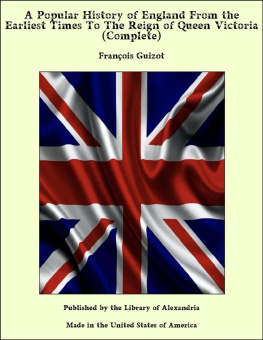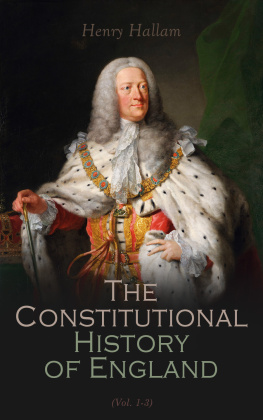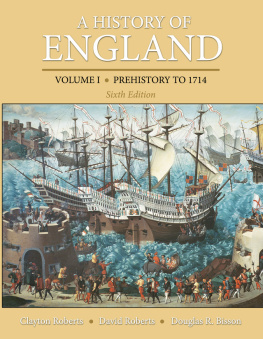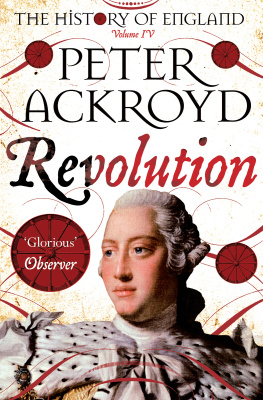Spencer Walpole - A History of England, Volume 4: From the Conclusion of the Great War in 1815
Here you can read online Spencer Walpole - A History of England, Volume 4: From the Conclusion of the Great War in 1815 full text of the book (entire story) in english for free. Download pdf and epub, get meaning, cover and reviews about this ebook. year: 2011, publisher: Barnes & Noble, genre: Detective and thriller. Description of the work, (preface) as well as reviews are available. Best literature library LitArk.com created for fans of good reading and offers a wide selection of genres:
Romance novel
Science fiction
Adventure
Detective
Science
History
Home and family
Prose
Art
Politics
Computer
Non-fiction
Religion
Business
Children
Humor
Choose a favorite category and find really read worthwhile books. Enjoy immersion in the world of imagination, feel the emotions of the characters or learn something new for yourself, make an fascinating discovery.
- Book:A History of England, Volume 4: From the Conclusion of the Great War in 1815
- Author:
- Publisher:Barnes & Noble
- Genre:
- Year:2011
- Rating:5 / 5
- Favourites:Add to favourites
- Your mark:
- 100
- 1
- 2
- 3
- 4
- 5
A History of England, Volume 4: From the Conclusion of the Great War in 1815: summary, description and annotation
We offer to read an annotation, description, summary or preface (depends on what the author of the book "A History of England, Volume 4: From the Conclusion of the Great War in 1815" wrote himself). If you haven't found the necessary information about the book — write in the comments, we will try to find it.
Spencer Walpole: author's other books
Who wrote A History of England, Volume 4: From the Conclusion of the Great War in 1815? Find out the surname, the name of the author of the book and a list of all author's works by series.
A History of England, Volume 4: From the Conclusion of the Great War in 1815 — read online for free the complete book (whole text) full work
Below is the text of the book, divided by pages. System saving the place of the last page read, allows you to conveniently read the book "A History of England, Volume 4: From the Conclusion of the Great War in 1815" online for free, without having to search again every time where you left off. Put a bookmark, and you can go to the page where you finished reading at any time.
Font size:
Interval:
Bookmark:
From the Conclusion of the Great War in 1815
SPENCER WALPOLE

This 2011 edition published by Barnes & Noble, Inc.
All rights reserved. No part of this publication may be reproduced, stored in a retrieval system, or transmitted, in any form or by any means, electronic, mechanical, photocopying, recording, or otherwise, without prior written permission from the publisher.
Barnes & Noble, Inc.
122 Fifth Avenue
New York, NY 10011
ISBN: 978-1-4114-5327-2
CHAPTER XIV
THE CLOSING YEARS OF WILLIAM IV
T HE Duke of Wellington, passing the autumn at Strathfieldsaye, was going out hunting, on the morning of the 15th of November, when the summons from the king reached him, and commanded his attendance at Brighton. On the same day four years before, his own Administration had suffered a final defeat in the House of Commons. At that time such an invitation as that which he received from the king in 1834 would have procured for him the insult, perhaps the attacks, of the populace. In 1834, on the contrary, the Whig papers denounced the conduct of the king in dismissing the Whigs; but the people watched without emotion the transfer of power from Whigs to Tories.
Wellington reached the king late on the 15th of November. The king explained to him the circumstances which had led to the dismissal of the ministry; and appealed to him for help. He pointed his appeal by referring to the insulting manner in which the ministerial crisis had been announced in the Times. He was, perhaps naturally, angry that the circumstance should have found its way into the papers at all; he was still more angry that the blame of it should have been laid upon the queen. The appeal was made to one who had never deserted his sovereign in a difficulty. Wellington consented to return to power. The battle, however, he saw clearly enough, would have to be fought in the House of Commons. Common prudence required that the chief command should be entrusted to the man who could be personally present at the brunt of the struggle. For himself he was ready to do subaltern's service. The chief place in the ministry he reserved for Peel.
Peel, however, thinking of anything but a crisis in the ministry, was passing the autumn in Italy; and Italy in 1834 was practically as far from Brighton as New York is now. It was impossible for any messenger to reach Rome in less than eight days. It was unlikely that Peel could return to London in less than three weeks; and a good deal might possibly happen in three weeks' time. Those persons who ventured on such calculations misunderstood the character of their sovereign. The king, angry with Brougham, Melbourne, and the Times, desired his ministers to resign their offices at once. He made Wellington First Lord of the Treasury; he entrusted him with the seals of the Home Office, and gave him the seals of the two other Secretaries of State. These arrangements virtually placed the patronage and the power of the State in the hands of one man. The politicians who used this language had hardly thought out its meaning. There was nothing unconstitutional in Wellington assuming four of the highest offices of the State at the instance of his king. Three of those offices had, in fact, been evolved out of one within his own lifetime; and one Secretary of State was and is technically competent to transact the business of all the others. The one thing which was unconstitutional in 1834, or which, in more correct language, was opposed to the practice of the Constitution, was the dismissal of the Whig Ministry. All that followed was only a corollary to that proceeding; and Whig statesmen would have done well to have confined their censure to the act, and to have abstained from criticising the arrangements which were consequent upon it. The general public, judging the matter more accurately, were merely amused at the spectacle which the Duke afforded them. They saw the man who had been the hero of their boyhood, who had again become the hero of their maturer years, driving from office to office, signing letters, dictating minutes, and discharging without assistance the work which it had previously taken four busy ministers to perform. Instead of blaming Wellington for straining the Constitution, most people praised him for his industry, and commended the singleness of character which raised all his actions above suspicion. Wellington had again become the hero of the nation; and the nation was gratified at the new proof which its hero was giving of his capacity for work.
In the meanwhile James Hudson, the queen's secretary, was travelling night and day, through France and Italy, searching for Peel. He found Peel at a ball at Prince Torlonia's, at Rome, on the evening of the 25th of November. Stanley's refusal compelled Peel to construct his ministry out of the old Tory party. Peel himself, confident in his superiority, and anxious to assert his authority, followed the example of his greatest predecessors, and took the offices of Prime Minister and Chancellor of the Exchequer. Lyndhurst was confirmed in the Chancellorship; Wellington was placed in the Foreign Office; Aberdeen became Colonial Secretary; Goulburn, Home Secretary; Hardinge, Chief Secretary; Ellenborough, President of the Board of Control; the other offices in the Cabinet were bestowed on gentlemen whose names it is not necessary to mention. The Cabinet of 1834, in fact, was a committee pledged to register the decisions of its chief. Three only of its members, Peel, Wellington, and Lyndhurst, spoke with the authority which enforces attention in the council-chamber. One alone, Peel himself, shaped the policy of the Administration.
Peel's superiority over his colleagues was almost immediately visible. On the 17th of December, eight days after his arrival in England, he read to them a letter which he had addressed to his constituents, detailing the policy which he intended his Government to pursue. Since the passing of the Reform Act he had represented Tamworth; the document, therefore, intended for a nation was nominally addressed to the electors of Tamworth, and has ever since been known in history as the Tamworth Manifesto. The mere fact that such a manifesto should have been issued at all formed a striking proof of the advance which had been made towards popular government. Peel avowed that he was addressing, through his constituents, "that great and intelligent class of society" of which they were merely representatives; and that he was offering them "that frank exposition of general principles and views which appears to be anxiously expected, and which it ought not to be the inclination, and cannot be the interest, of a minister of this country to withhold."
The "frank exposition" must have been bitter reading to some of the members of the new Cabinet. Peel seemed above all things anxious to prove that he had always been a reformer. He reminded the nation, with perfect justice, that he had promoted the reform of the currency; that he had consolidated and amended the Criminal Code; that he had reformed many branches of jurisprudence; and that, in his place in Parliament, he had accepted the Reform Bill as "a final and irrevocable settlement of a great constitutional question." He could appeal with confidence to the past to prove that he had never been "the defender of abuses or the enemy of judicious reforms." He would never oppose "the correction of proved abuses and the redress of real grievances." His predecessors had advised the Crown to issue a commission of inquiry into the constitution of municipal corporations. He had every disposition to give the commissioners' report a full and unprejudiced consideration. His predecessors had proposed, and he himself had supported, a measure for the abolition of Church rates, and the compensation of the Church out of the Consolidated Fund. His predecessors had proposed, and he himself had supported, the principle of a bill for relieving the conscientious scruples of Dissenters in the celebration of their marriages. His predecessors had supported a bill for the admission of Dissenters to the Universities. He himself was of opinion that "if regulations, enforced by public authorities superintending the professions of law and medicine, and the studies connected with them, had the effect of conferring advantages of the nature of civil privileges on one class of the king's subjects, those regulations ought to undergo modification." It was true that he had resisted a retrospective inquiry into the Pension List, but he had supported Althorp in confining future pensions to such persons only as have just claims to the royal beneficence on account either of their public services or of their scientific or literary eminence. It was true that he had refused to assent to the alienation of the property of the Irish Church. But he had always been in favour of its improved distribution. Nor were his views on Church reform confined to Ireland alone. He had always desired that the tithes of the English Church should be commuted on just principles. He was ready to inquire into the laws which governed its establishment. Reform in Church and State at home; the maintenance of peace abroadthese were the objects which Peel offered to the country in the Tamworth Manifesto.
Font size:
Interval:
Bookmark:
Similar books «A History of England, Volume 4: From the Conclusion of the Great War in 1815»
Look at similar books to A History of England, Volume 4: From the Conclusion of the Great War in 1815. We have selected literature similar in name and meaning in the hope of providing readers with more options to find new, interesting, not yet read works.
Discussion, reviews of the book A History of England, Volume 4: From the Conclusion of the Great War in 1815 and just readers' own opinions. Leave your comments, write what you think about the work, its meaning or the main characters. Specify what exactly you liked and what you didn't like, and why you think so.









